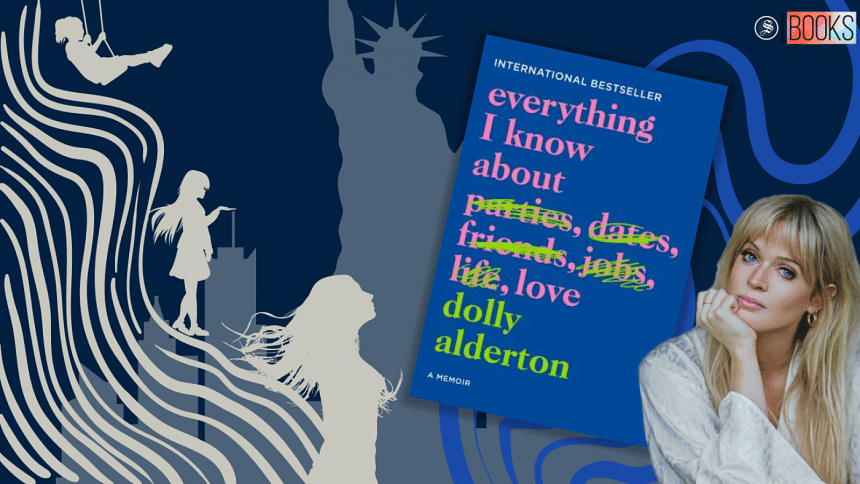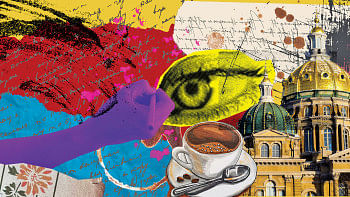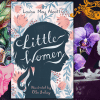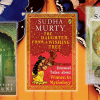Girlfriends, girlhood and everything else Dolly Alderton knows about love

There's a cardinal sin we've all committed when we face our regular manic splurges and order seven books in one sitting—we judge some of the books by their covers. Dolly Alderton's memoir about (parties, dates, friends, jobs, life, and) love was a book that I bought mostly for the "vibes", I'm afraid—she had me at the font. The back was littered with rave reviews about how funny and brilliant and intimate and heartfelt the book was, which unfortunately is often looked at as a true indication that a book isn't good because, realistically, for something to be so universally liked you have to realise that the author probably didn't take a lot of risks, that the book was fairly palatable, that it didn't have anything more to it. But it seems that Dolly Alderton deserves the blurbs because one of the reviews promised me that "it would leave you smiling"—and leave me smiling it certainly did, even though it made me frown through the first 37 pages.
In her memoir, Dolly Alderton scrounges up four different lists that comprise everything she knows about love at four different stages of life. The first section follows everything she knows about love as a teenager. It starts in the early aughts and is steeped in nostalgia. It's MSN messenger, dial-up internet, and reruns of Sabrina the Teenage Witch. She describes the early days of internet forums and chat rooms, when it was aesthetically acceptable for your username to include lots of underscores and numbers. From bad dates with internet boyfriends that lasted for twelve minutes to bad parties at college and her first New Years' away from home, everything was very intricately 2000s.
But this is the part of the book that belongs in the first 37 pages that made me want to put the book down. It's that feeling when you really want to love a book—because at least one of those reviews must have counted for something, where is it?—but it proves to be extremely difficult. I started reading this book on the train and I remember unconsciously letting out a couple of obnoxiously loud, annoyed sighs and tsk-tsks that resulted in questioning stares from the stranger next to me. Dolly Alderton's younger self is very hard to like, and if I'm being completely honest, perhaps a part of that is in connection to the unrelatability of her teenage version. But she also appeared noticeably self-absorbed and reckless. The drinking, the drugs, the ungodly amount of both, and the stories that she lives to tell are funny, but perhaps just for the sake of being stories that come from being too drunk and too inebriated.
I constantly found myself feeling worried for her, and even more often than that, feeling sad. One of these stories describes the time she'd decided to take a 200-pound taxi cab joyride three counties away with only 100 pounds in her purse. Another is the time she and her friend, Hicks, decided to accompany two middle-aged men from Dubai to their even older friend Rodney's house in a strange part of town, assured that he was a proper "party boy". Alderton admits the disregard for her safety but insists that, "…they were all good stories, and that's what mattered."
Thankfully, this passes and I've reached the 2007 New Year's Eve, and it seems that I no longer have to keep reminding myself that this is supposed to be enjoyable. Alderton presents me with a new, changed list of the things she knows about love at 21. By this time, she's battled an eating disorder, fallen in (and out of) love for the first time, and fallen back in love with cooking. This is when my eye rolls start to give way to big smiles, as I find myself relating to her despite the obvious differences. She talks about her father, who is only capable of remembering one single, specific detail about each of her friends, and chooses to keep bringing it up in conversation; about still remembering her best friend's mother's landline number by heart, and dealing with the more devastating heartbreak that a lot us have faced when the same best friend decides to abandon you for the boy she (thinks she) would ultimately decide to marry.
Big smiles then give away to laughs and giggles, and luckily this time I'm lying on my bed next to a friend or during lunch break at campus sipping too-sweet tea, and I don't have to put the book away, I can just read it out so we all get to laugh together. There's an adorable, funny memory Alderton mentions in the chapter, "The Uncool Girls of Uncool Camden", when, having moved into a new apartment with her friends, they realised they'd spent most of their money to cover the deposit; seeing how they barely had any left for decorations, her friend, Farley, decided to stick post-it notes all around their apartment, reassuring everyone that, "TV WILL BE HERE" and "TOASTER WILL BE HERE".
My own post-it notes bookmarks also showed up more frequently then, the same friend half-jokingly chiding that I should save some of that annotating enthusiasm for my philosophy quiz on Sunday. But I couldn't help it, of course. "I am so grateful that I fetishized the measured-out-in-coffee-spoons minutiae of adulthood so vividly as a teenager because the relief of finally getting there meant I have found very little of it to be a burden," deserved a bookmark. I too loved paying rent and cooking for myself and standing in line at the bank.
This is when you feel like you can see Dolly Alderton grow up in real time. She is no longer the self-absorbed 19 year-old from the first half of the book. I no longer find myself feeling sorry for her, but very unpredictably sorry for both of us in some ways. When she addresses a fictional email to her friends with, "I'd love to have you round to witness my attempt at behaving like an adult," it feels like an email I could send to my friends, too. This is when the narration starts to feel a lot more intimate, a lot more feminine. It moves from self-hatred to self-discovery, and girlhood and girl-friendships are now the main characters. It's not just her attempt at behaving like an adult but trying to do so as a woman. Alderton moves the spotlight away from the boy-crazy teenager whose only idea of a good time was to get blackout drunk and, instead, she tells us about her best friends. All the sweetest parts about living in a tiny apartment with your favourite girlfriends are there: engagement parties with the maid-of-honour speech stolen verbatim from My Best Friend's Wedding, wedding plans that fall apart, and birthday surprises with a tray of cupcakes, and struggling to light the candles while someone else barricades the bathroom door so it's not ruined.
One of the most impressive details about this memoir is the beautiful set of characters we get introduced to. Whether it's Ivan, the manager of a local corner shop who is summoned every time the mouse shows up, or CJ, Dolly's incompetent substitute drug dealer who regularly hands out the wrong orders to the wrong customers and stupidly shows up at her door asking for the product back, they are all equally memorable. Of course, the main stars of the book are her best friends, AJ, Lacey, Hicks, India, Belle, Lauren, and especially Farley, who had spent every birthday since her twelfth blowing out candles with Dolly herself.
As I neared the end of the book, I found myself smiling a lot more and nodding along to Dolly Alderton, especially when she arrived in New York. The city is nothing like she imagined and she longs for the Tottenham Court Road she used to find pathetic. She rediscovers what love really means to her when she leaves the big apple and walks back home with Farley after her little sister's funeral, realising that it can be as simple as breathing. She finds love in her empty bed, in the records her friend has bought as presents, in smudged recipe cards from her mother. As she says in my favourite chapter of the book, "Homecoming", "And I also know that love is a pretty quiet thing. It's lying on the sofa together drinking coffee, talking about where you're going to go that morning to drink more coffee. It's folding down pages of books you think they'd find interesting. […] It's the texts: 'Hope today goes well', 'How did today go?' 'Thinking of you today' and 'Picked up loo roll'."
Now that I've finished this book, I actually love that I disliked the years in the beginning so much. I'm not sure if Dolly's transformation would be as evident otherwise, and anyway, who doesn't cringe at the thought of their past selves? Having the first part of the book be so tedious and careless only made me love the end a lot more. Everything I know About Love is a book you definitely enjoy more on a second read, and I don't mind that one bit.
Arshi Ibsan Radifah is a Literature Major who loves unreliable narrators and Wes Anderson movie sets. Please send her all your rec lists at [email protected].

 For all latest news, follow The Daily Star's Google News channel.
For all latest news, follow The Daily Star's Google News channel. 








Comments